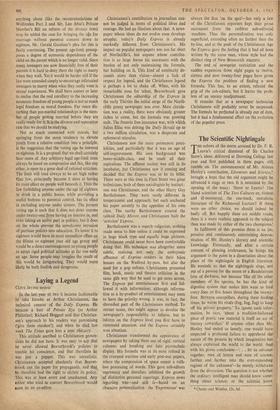Laying a Legend
CLIVE IRVING writes: In the last year or two it became fashionable to take knocks at Arthur Christiansen, the technical creator of the Daily Express. He became a butt of Private Eye (as Arthur Philistine); Richard Hoggart said that Christian- sen's approach to his readers was patronising ('give them stardust); and when he died last week The Times gave him a sour obituary.
This attitude ascribed to Christiansen preten- sions he did not have. It was easy to say that he never allowed Beaverbrook's policies to trouble his conscience, and that therefore he was just a puppet. This was unrealistic. Christiansen accepted absolutely that Beaver- .brook ran the paper for propaganda, and that he therefore had the right to dictate its policy. This was at least overt and unashamed. Any editor who tried to convert Beaverbrook would soon be an ex-editor. Christiansen's contribution to journalism can- not be judgesI in terms of political ideas and courage. He had no illusions about that. A news- paper whose ideas do not evolve soon develops atrophy; today's Daily Express is already markedly different from Christiansen's. His impact on popular newspapers was not far short of Northcliffe's, but anyone whose contribu- tion is so large leaves his successors with the burden of not only maintaining the formula, but building on it. This kind of continuity de- mands more than vision—almost a lack of respect for legend, and the Christiansen legend is perhaps a lot to shake off. When, with his remarkable nose for talent, Beaverbrook gave Christiansen the editorship of the Express in the early Thirties the initial surge of the North- cliffe penny newspaper was over. Mass circula- tion was a reality, there were obviously greater riches to come, but the formula was growing stale. The frenetic free insurance war, with which Julius Elias was driving the Daily Herald up to a two million circulation, was a desperate and ephemeral stimulus.
Christiansen saw the more • permanent possi- bilities, and particularly that it was an age of self-improvement. His own background was lower-middle-class, and he smelt all their aspirations. The affluent society was still in its incubator, but Christiansen saw it coming and decided that the Express was to be its bible. There were at this time in Fleet Street two great technicians, both of them sociologists by instinct: one was Christiansen, and the other Harry Guy Bartholomew. They were vastly different in temperament and approach, but each anchored his paper astutely to the appetites of 'his own class. The earthy Bartholomew created the tabloid Daily Mirror, and Christiansen built the 'arriviste' Express.
Bartholomew was a superb vulgarian; nothing made sense to him unless it could be expressed in huge black type and equally huge pictures. Christiansen could never have been comfortable doing that. His technique was altogether more subtle, realising not only the embryonic affluence of Express readers in their bijou houses on the Watford by-pass, but also the need for a pop culture. Christiansen presented film, book, music and theatre criticism in the same glib way that he used to get news across. The Express put entertainment first and fol- lowed it with information; although informa- tion as a by-product of entertainment may seem to have the priority wrong, it was, in fact, the shrewdest part of the Christiansen method. To sterner tastes, this might appear to devalue the newspaper's responsibility to inform, but to inform on the Express level you first have to command attention, and the Express certainly won attention.
Christiansen transformed the appearance of newspapers by taking them out of rigid, vertical columns and breaking out into pyrotechnic display. His formula was at its most refined in the cramped wartime and early post-war papers, where the compression of space meant a ruth- less processing of words. This gave sub-editors supremacy and therefore inhibited the growth of distinctive personal reportage. Express news reporting was—and still is—based on an obsessive personalisation----the 'Expressman' was always the first 'on the spot'—but only a few of the Christiansen reporters kept their prose sacrosanct from the ruthless sub-editorial machine. Thus the personalisation was only superficial, extending often no further than the by-line, and at the peak of the Christiansen Age the Express gave the feeling that it had all been written by the same man, whose style had the distinct ring of New Brunswick staccato.
The end of newsprint restriction and the sudden expansion from eight pages to twelve, sixteen and now twenty-four pages have given the Express the problem of finding a new formula. This has, to an extent, relaxed the grip of the sub-editors, but it leaves the prob- lem of an uneasy readjustment: It remains that as a newspaper technician Christiansen will probably never be surpassed. The formula he perfected is already out of date, but it had a fundamental affect on the evolution of the popular press.










































 Previous page
Previous page